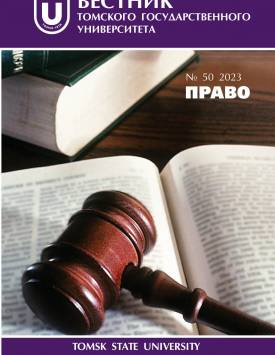Shares in Russian legislation and their role in corporate governance practice
The relevance of the topic of the article is mediated by the fact that the institution of shares, inextricably linked to the issues of creation and operation of joint stock companies, is of great importance for the socio-economic development of Russia. To date, the analysis of the legal regime of shares, improvement of legal regulation of civil turnover of shares, protection of shareholders' rights and prevention of abuses by the management of joint-stock companies, elimination of contradictions in the legislation remain topical tasks. The article considers the concept, certain types of shares, as well as the issues of functioning of the institute of shares as an instrument of corporate governance. In Russian legislation, the "book-entry" nature of a share is compensated for by the documented fixation of the rights certified by the security by an authorised person in the relevant accounting records, i.e. only the method of legitimisation of the rights secured by the share has changed. With regard to fractional shares it is noted that the Russian legislation does not have their legal definition, but only their features and three cases of occurrence are fixed. The study of the legal nature of fractional shares has allowed to argue the expediency of expanding the list of cases of formation of fractional shares by including in this list cases of arising of the ownership right to the whole share of two or more persons. Speaking about treasury shares, it should be emphasised that they are not a separate type of shares, but are characterised by a special legal regime due to the shares belonging to the joint-stock company that placed them. In this case, a condition arises when the joint-stock company itself possesses shares certifying the rights in respect of this company, and the corporate rights are disposed of by the company itself, but in the person of an authorised body. The study of the issuance of securities in digital form allowed us to note that today we should not talk about the possibility of issuing "digital shares" by a non-public joint-stock company, but about a new type of joint-stock companies built around "digital shares". The legal nature of the rights granted by a share to participate in the management of a joint-stock company is mediated by the fact that the shareholder's non-property rights, together with property rights, are synthesised into a single right of membership, which is generally of a property nature. The value of non-property rights granted by shares is much higher than property rights. By exercising participation rights through the management of a joint stock company, shareholders can earn both on the growth of the company's capitalisation and on its cash flow management. Such income may be higher than dividends, the decision on payment of which depends on voting at the general meeting of shareholders, i.e. on the realisation of non-property rights. In these circumstances, the non-property right that provides an opportunity to influence decision-making by the management bodies of a joint stock company is key. The author declares no conflicts of interests.
Keywords
share, corporate securities, corporate governanceAuthors
| Name | Organization | |
| Sakharova Yulia V. | Russian State University for the Humanities | 1887342@mail.ru |
References

Shares in Russian legislation and their role in corporate governance practice | Tomsk State University Journal of Law. 2023. № 50. DOI: 10.17223/22253513/50/13
